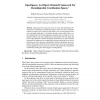Free Online Productivity Tools
i2Speak
i2Symbol
i2OCR
iTex2Img
iWeb2Print
iWeb2Shot
i2Type
iPdf2Split
iPdf2Merge
i2Bopomofo
i2Arabic
i2Style
i2Image
i2PDF
iLatex2Rtf
Sci2ools
138
click to vote
COORDINATION
2000
Springer
2000
Springer
OpenSpaces: An Object-Oriented Framework for Reconfigurable Coordination Spaces
Abstract. Tuple spaces have turned out to be one of the most fundamental abstractions for coordinating communicating agents. At the same time, researchers continue to propose new variants of tuple spaces, since no one approach seems to be universally applicable to all problem domains. Some models offer a certain configurability, but existing approaches generally stop at a fixed set of configuration options and static configuration at instantiation time. We argue that a more open approach is needed, and present OPENSPACES, an object-oriented framework that supports static configurability through subclassing across several dimensions, as well as dynamic configurability of policies through run-time composition. We introduce OPENSPACES by showing how it can be used to instantiate a typical application, and we present an overview of the framework, implemented in Smalltalk, detailing the various degrees of configurability.
Certain Configurability | COORDINATION 2000 | Distributed And Parallel Computing | Static Configurability | Tuple Spaces |
| Added | 24 Aug 2010 |
| Updated | 24 Aug 2010 |
| Type | Conference |
| Year | 2000 |
| Where | COORDINATION |
| Authors | Stéphane Ducasse, Thomas Hofmann, Oscar Nierstrasz |
Comments (0)

